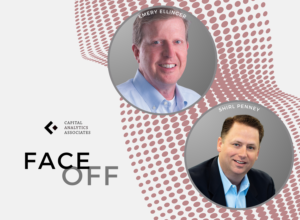Writer: Joshua Andino
 2 min read August 2023 — Despite a few bank failures and interest rates dominating the headlines over the course of the year, financial services firms have managed to perform relatively well in the Tampa Bay region thanks to strong population growth, business in-migration and the area’s increasingly international profile. Invest: spoke to the leaders of two prominent, local financial services firms to understand today’s circumstances and what they see moving forward, both for their industry and the region overall.
2 min read August 2023 — Despite a few bank failures and interest rates dominating the headlines over the course of the year, financial services firms have managed to perform relatively well in the Tampa Bay region thanks to strong population growth, business in-migration and the area’s increasingly international profile. Invest: spoke to the leaders of two prominent, local financial services firms to understand today’s circumstances and what they see moving forward, both for their industry and the region overall.
What is your growth strategy?
Shirl Penney, President & CEO, Dynasty Financial Partners: “At Dynasty, we are expanding rapidly and we are hiring across the board. Most recently, we onboarded talent specific to the investment bank from some of the big firms, some of whom we relocated here. We hired a very senior investment banker from Goldman Sachs, a senior investment banker from UBS and a senior banker from Raymond James. Those well-known, larger-scale investment banks cover all types of industry sectors. For us, we are bringing that level of sophistication and capability into the market to focus on transactions between $20 million and $200 million. That is the sweet spot for RIA firms. In today’s ecosystem, the only resource available to advisers are consultants or business brokers. It’s not an investment banker coming in and doing the strategic analysis, building the model, coordinating with tax and legal and shopping and running an actual transaction. That level of sophistication previously did not exist in the space until we launched our investment bank.”
 Emery Ellinger, CEO, Aberdeen Advisors: “Both our headcount and our deal count have grown exponentially. We just ensure we have the most qualified staff and work on the strongest deals. Going forward, we are going to rapidly expand. We’re all over the southeast, but we want to have people in some of the other states and markets that we cover like Tennessee, Alabama, Georgia, North Carolina and Virginia. Although we have growth plans, those won’t distract us from our core business of selling companies. We do one thing, but we do it well.”
Emery Ellinger, CEO, Aberdeen Advisors: “Both our headcount and our deal count have grown exponentially. We just ensure we have the most qualified staff and work on the strongest deals. Going forward, we are going to rapidly expand. We’re all over the southeast, but we want to have people in some of the other states and markets that we cover like Tennessee, Alabama, Georgia, North Carolina and Virginia. Although we have growth plans, those won’t distract us from our core business of selling companies. We do one thing, but we do it well.”
What trends within the market are you following?
Penney: “Fortunately, bank failures will remain isolated to those that have already been in the headlines. Those bank failures have definitely put some of those advisers and organizations in motion. You can expect firms like Dynasty with a fortress balance sheet to pick some of them up.
That being said, it has opened the eyes of both the consumer and the adviser that the best place to be is full independence. Billionaires in this country manage their money through a family office, which is essentially a triangulated advisory model. You have a family office of advisers that only work for that singular family with no other conflicts. Separately, they can place their assets elsewhere and go to any product benefactor and provide products to implement the investments. They have technology to combine the experience to record for the client.
What Dynasty has done is help democratize the triangulation of advice. If you are a $500,000 client working with an adviser powered by Dynasty, we have $80 billion of buying power to get behind the independent adviser sitting on the same side of the table as the consumer. Dynasty ties the entire process together for the most efficient result. There are significant conflicts in working within the same silo of your family office; it’s important to have a relationship with someone who has relationships everywhere to connect the dots independently.
The bank failures have essentially made people realize that their best position is independence because custody is no longer the best place. I’m not handcuffed to one place; if I want to, I can switch my assets to ensure a better balance sheet. I believe the unintended impact of this will be on the entrepreneur. It will be tougher to get liquidity. We have pivoted significantly on our investment platform, as this will be the heyday for private credit to step in where banks used to. Regional banks used to play that role and they will be way more careful going forward as credit dries up. There is potential for the other shoe to drop around commercial real estate credit portfolios; this is not a Florida thing but a more national factor. Some of those commercial properties have been significantly stressed as some pockets of the country are still working from home instead of working from work.”
Ellinger: “As interest rates go up, valuations by definition go down. There is a higher cost to buying a business, so the seller should expect a lower payment so the buyer can still get a return on investment. The lending market has tightened up and buyers are more cautious. Of course, industries are cyclical. Just a few months ago, technology companies were coveted but now the tides have turned, and I would advise technology clients against selling in the next six-month period. After about a year, there’s going to be more investment back into technology and the prospects and valuations will improve. In certain circumstances, a company can be sold in a down cycle if it holds a lot of value for the acquirer. Everything depends on each company’s situation.”
When you look at your industry and across Tampa Bay, what’s next?
Penney: “I believe that the entire Tampa Bay region needs to pull together and work as a team. Over the next five years, we need to be much more coordinated in a one-plus-one-equals-three way to understand that a rising tide lifts all boats in the Tampa Bay region. As someone who is new to the area in the last five years, it surprises me to hear some of the local competitiveness. It’s a bit short-sighted. I understand that it is deeply rooted and multigenerational in some instances but the reality is that when you talk about moving forward, Tampa is not competing with St. Petersburg. This area is competing with Atlanta, Nashville, Austin, New York, London, Singapore and Hong Kong. It’s a global economy and there are so many amazing things about Tampa and St. Pete. If you tell a unified story, the opportunity for success for the area goes up significantly. We have the best of all worlds here; it’s on us to tell that story so we can win disproportionately. Success is not a given; it’s something that requires leadership, focus and commitment to excellence.”
Ellinger: “We have a silver tsunami coming with the baby boomer generation retiring. Business transfers are complex but inevitable; 100% of those who own businesses today are going to exit in one way or another. Given the scale of this generational transfer, we can take advantage of that, which is why we need to grow. We need more resources to catch this wave of business owners selling to the next generation.”
For more information, please visit:

